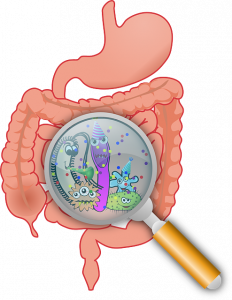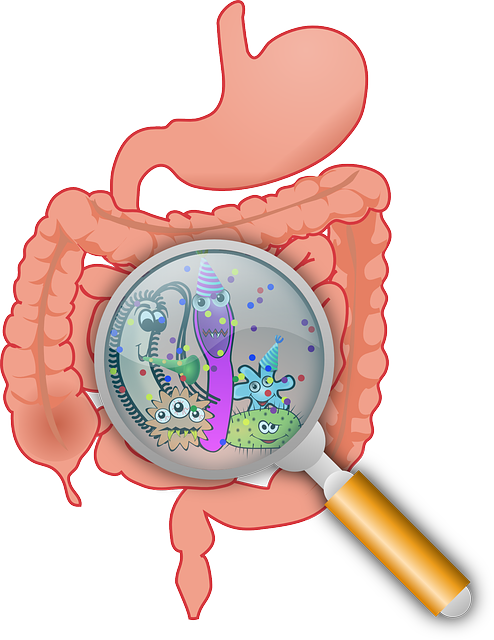You may have heard the term ‘gut microbiome’ thrown around lately – well, that’s what we’re diving into today.
First off, let me tell you: your gut is not just responsible for digestion. It plays a vital role in everything from immunity to mental health.
When your gut microbiome is balanced and healthy, it can help prevent disease and inflammation throughout your body. But when things are out of whack down there…well, let’s just say it ain’t pretty.
So buckle up as we take a deep dive into all things gut health and learn how taking care of our tummies can lead to happier, healthier lives overall.
The Gut Microbiome: What Is It And Why Is It Important?
 The gut microbiome is a complex ecosystem of microorganisms that reside in the digestive tract. It plays a vital role in maintaining overall health and well-being.
The gut microbiome is a complex ecosystem of microorganisms that reside in the digestive tract. It plays a vital role in maintaining overall health and well-being.
The microbial diversity within the gut can have significant impacts on various bodily functions, including digestion, immune system response, nutrient absorption, and even mental health.
The gut-brain axis refers to the communication network between the brain and the gut. This connection allows for bidirectional signaling, meaning messages are sent back and forth between both organs.
Research has shown that changes in the gut microbiome can affect neurotransmitter production in the brain, which can ultimately impact mood and behavior.
Maintaining a healthy balance of bacteria in the gut is crucial for optimal health. Poor dietary choices, stress, antibiotics, and other factors can disrupt this delicate balance.
Investing in proper nutrition and lifestyle habits like exercise and stress management can help promote a thriving gut microbiome. By doing so, we may be able to prevent chronic diseases ranging from obesity to depression.
Understanding The Connection Between Gut Health And Immunity
Maintaining a healthy gut is crucial for overall wellness, including immunity. The gastrointestinal tract is responsible for approximately 70% of our immune system function. This means that any disruptions in gut health can weaken our immune response and increase the risk of infections.
Dietary interventions play a significant role in maintaining good gut health. A diet rich in fiber, fruits, vegetables, lean protein, and fermented foods such as yogurt or kefir helps to nourish the beneficial bacteria in our gut microbiome. On the other hand, diets high in sugar, processed foods, and unhealthy fats disrupt this balance and contribute to inflammation, which can negatively impact immunity.
Probiotic supplements are another useful tool for improving gut health and strengthening immunity. These supplements contain live microorganisms that provide numerous benefits to the body when consumed regularly. Probiotics help to restore the natural balance of bacteria in your gut by increasing the number of beneficial organisms while reducing harmful ones.
Here are five ways to improve your gut health and strengthen immunity:
- Incorporate more fiber into your diet
- Eat fermented foods like kimchi or sauerkraut
- Reduce sugar intake
- Exercise regularly
- Consider taking a probiotic supplement
Remember that maintaining good gut health goes beyond just physical wellbeing – it also has an impact on mental health. By prioritizing dietary interventions and incorporating probiotic supplements into your routine, you’ll be well on your way towards enhancing both your physical and mental wellbeing without sacrificing flavor or enjoyment from food!
The Link Between Gut Health And Mental Health
Now that we understand the connection between gut health and immunity, let’s dive into another fascinating aspect of gut health: its link to mental health.
The gut brain axis refers to the bidirectional communication system connecting our central nervous system with our enteric nervous system. This means that the state of our gut can influence our mood and vice versa. Recent research has shown that imbalances in the microbiome can lead to anxiety, depression, and other mental health issues.
One way to support a healthy gut microbiome is through probiotics. Probiotics are live microorganisms that benefit their host by improving microbial balance. These beneficial bacteria can improve digestion, strengthen immunity, reduce inflammation, and even alleviate symptoms of anxiety.
Studies have found that certain strains of probiotics such as Lactobacillus rhamnosus and Bifidobacterium longum can positively affect emotional well-being.
Anxiety disorders affect millions of people worldwide and can significantly impact daily life. While there are various treatments available for managing anxiety, supporting a healthy gut may also be an effective approach.
Incorporating probiotic-rich foods like yogurt or kefir into your diet or taking a high-quality probiotic supplement may help improve your overall gut health and potentially ease feelings of anxiety.
By optimizing your digestive health, you’re not only supporting physical wellness but also promoting optimal mental well-being.
Tips For Maintaining A Healthy Gut Microbiome
Maintaining a healthy gut microbiome is crucial for overall wellness. The state of your gut bacteria plays a significant role in various bodily functions, from digestion to immunity and even mental health. But with the abundance of processed foods and stressful lifestyles, it’s easy to neglect our gut health.
Here are some tips that can help you keep your gut happy and thriving.
Firstly, incorporate fermented foods into your diet regularly. These include yogurt, kefir, kimchi, sauerkraut, and kombucha, among others. Fermented foods contain live cultures of beneficial bacteria known as probiotics that aid in maintaining a balanced gut microbiome.
Secondly, consume prebiotic fibers found in fruits and vegetables such as bananas, garlic, onions, leeks, asparagus, and artichokes. Prebiotics serve as food for good bacteria in the colon and promote their growth while suppressing harmful microbes’ activity.
Thirdly, avoid taking antibiotics unless necessary since they kill both good and bad bacteria indiscriminately. Instead of reaching out for antibiotics at every sign of illness or infection, try natural remedies first.
Lastly, manage stress levels through meditation or other relaxation techniques. Stress has been shown to disrupt gut flora balance by reducing the number of friendly bacteria present in the digestive tract.
Incorporating these simple tips will go a long way towards promoting optimal gut health. Remember that small changes eventually add up to significant improvements!
Gut Health And Disease Prevention: What The Research Says
Dietary interventions have been shown to play a crucial role in maintaining gut health. Studies suggest that diets rich in fruits, vegetables, whole grains, and lean proteins may help promote the growth of beneficial bacteria in the gut. In contrast, diets high in processed foods and sugar can lead to an imbalance of gut bacteria and inflammation.
Probiotics are another important factor when it comes to disease prevention through gut health. These live microorganisms can provide numerous benefits for the microbiome, including improved digestion and immune function. Research has also suggested that certain strains of probiotics may reduce the risk of chronic diseases such as heart disease, type 2 diabetes, and even some forms of cancer.
The link between the microbiome and chronic disease is an area of growing interest among researchers. A disrupted microbiome has been associated with various conditions such as inflammatory bowel disease (IBD), autoimmune disorders, allergies, and mental health issues.
By taking steps to maintain a healthy balance of gut bacteria through diet and probiotic supplementation, individuals may be able to lower their risk for these types of illnesses and improve overall wellness.
Can Stress Impact Gut Health?
It’s no secret that stress can have a significant impact on our overall health, and that includes gut health.
When we experience stress, it triggers the gut brain axis, which can lead to gut inflammation and compromise our immune system.
As a result, a healthy gut is crucial for overall wellness, and managing stress levels should be an essential component of any gut-health routine.
By prioritizing self-care practices such as mindfulness meditation or yoga, we can help mitigate the negative effects of stress on our bodies and support optimal digestive function.
How Does The Gut Microbiome Differ Between Individuals?
The gut microbiome is an incredibly complex and unique ecosystem within each individual’s body.
Fecal transplants have shown promise in treating certain conditions by altering the composition of gut bacteria, highlighting just how much variation there can be between people.
Personalized nutrition plans that take into account an individual’s specific microbiome makeup may also hold great potential for improving overall health and addressing issues like inflammation or digestive discomfort.
It’s clear that more research is needed to fully understand the intricacies of the gut microbiome and its impact on our well-being, but these developments offer exciting possibilities for personalized healthcare approaches.
Are Probiotics Necessary For Maintaining A Healthy Gut?
Maintaining a healthy gut is essential for overall wellness, and probiotics have been touted as the solution. However, while they can be effective in some cases, there are alternative solutions that may work better for certain individuals.
It’s important to remember that not all probiotics are created equal and their effectiveness depends on various factors such as dosage and strain specificity. I believe it’s crucial to explore other options such as prebiotics and fermented foods which can also promote the growth of beneficial bacteria in the gut.
Ultimately, finding what works best for an individual requires a personalized approach based on their unique microbiome composition and lifestyle factors.
Can A Poor Diet Permanently Damage The Gut Microbiome?
Long term consequences of a poor diet on the gut microbiome are increasingly being recognized by health professionals. Studies show that an unhealthy diet, high in sugar and refined carbohydrates, can lead to imbalances within the gut microbial community resulting in chronic inflammation and other digestive issues.
However, dietary interventions including consuming prebiotic-rich foods such as whole grains, fruits and vegetables can help restore balance and promote optimal gut health.
It’s important to prioritize a healthy diet for maintaining not only gut health but overall wellness.
Can Gut Health Impact Skin Health?
I can confidently say that there is indeed a connection between the gut and skin.
Research has shown that a healthy gut microbiome with diverse bacteria can lead to improved skin health.
On the other hand, an imbalance in the microbiome can trigger inflammation which may manifest on the skin as acne, eczema or psoriasis.
Therefore, it’s important to focus on maintaining microbiome diversity through consuming a variety of nutrient-dense foods including probiotics and prebiotics to support both gut and skin health.
I cannot stress enough the importance of maintaining a healthy gut. It is not only crucial for our digestive system but also plays a significant role in overall wellbeing.
On one hand, stress can negatively affect our gut microbiome by disrupting its balance. On the other hand, probiotics may be necessary to maintain good gut health. Yet, it is important to remember that everyone’s gut microbiome differs and what works for some may not work for others.
Additionally, a poor diet can have long-lasting effects on the gut microbiome. Moreover, research suggests that there may be a connection between gut health and skin health. Taking care of your gut could potentially lead to clearer skin!
So let us take charge of our own health by making conscious choices towards better nutrition and lifestyle habits that support a flourishing gut ecosystem.









